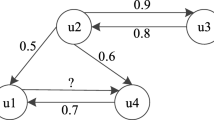Abstract
Recommender systems are one of the most important technologies in e-commerce to help users filter out the overload of information. However, current mainstream recommendation algorithms, such as the collaborative filtering CF family, have problems such as scalability and sparseness. These problems hinder further developments of recommender systems. We propose a new recommendation algorithm based on item quality and user rating preferences, which can significantly decrease the computing complexity. Besides, it is interpretable and works better when the data is sparse. Through extensive experiments on three benchmark data sets, we show that our algorithm achieves higher accuracy in rating prediction compared with the traditional approaches. Furthermore, the results also demonstrate that the problem of rating prediction depends strongly on item quality and user rating preferences, thus opens new paths for further study.
Similar content being viewed by others
References
Adomavicius G, Tuzhilin A. Toward the next generation of recommender systems: a survey of the state-of-the-art and possible extensions. IEEE Transactions on Knowledge and Data Engineering, 2005, 17(6): 734–749
Ricci F, Rokach L, Shapira B, Kantor P B. Recommender Systems Handbook. Springer, 2010
Lü L Y, Medo M, Yeung C H, Zhang Y C, Zhang Z K, Zhou T. Recommender systems. Physics Reports. 2012, 519: 1–49
Ekstrand M D, Riedl J, Konstan J A. Collaborative filtering recommender systems. Foundations and Trends in Human-Computer Interaction, 2011, 4(2): 175–243
Dror G, Koenigstein N, Koren Y. Web-scale media recommendation systems. Proceedings of the IEEE, 2012, 100(9): 2722–2736
Takács G, Pilászy I, Németh B, Tikk D. Scalable collaborative filtering approaches for large recommender systems. Journal of Machine Learning Research, 2009, 10: 626–656
Koren Y, Bell R, Volinsky C. Matrix factorization techniques for recommender systems. Computer, 2009, 42(8): 30–37
Zhou T, Ren J, Medo M, Zhang Y C. Bipartite network projection and personal recommendation. Physical Review E. 2007, 76(4): 046115
Zhang Y C, Blattner M, Yu Y K. Heat conduction process on community networks as a recommendation model. Physical Review Letters, 2007, 99(15): 154301-1–154301-4
Zhou T, Kuscsik Z, Liu J G, Medo M, Wakeling J R, Zhang Y C. Solving the apparent diversity-accuracy dilemma of recommender systems. Proceedings of National Academy of Sciences, 2010, 107(10): 4511–4515
Huang Z, Chen H, Zeng D. Applying associative retrieval techniques to alleviate the sparsity problem in collaborative filtering. ACM Transactions on Information Systems, 2004, 22(1): 116–142
Yang S H, Long B, Smola A, Sadagopan N, Zheng Z, Zha H. Like like alike-joint friendship and interest propagation in social networks. In: Proceedings of the 20th International Conference on World Wide Web. ACM Press. 2011: 537–546
Shang M S, Zhang Z K, Zhou T, Zhang Y C. Collaborative filtering with diffusion-based similarity on tripartite graphs. Physica A, 2010, 389(6): 1259–1264
Cacheda F, Carneiro V, Fernĺćndez, D, Formoso V. Comparison of collaborative filtering algorithms: Limitations of current techniques and proposals for scalable, high-performance recommender systems. ACM Transactions on the Web. 2011, 5(1), Article 2
Resnick P, Iacovou N, Suchak M, Bergstrom P, Riedl J. GroupLens: An Open Architecture for Collaborative Filtering of Netnews. In: Proceedings of the ACM Conference on Computer Supported Cooperative Work. 1994, 175–186
Linden G, Smith B, York J. Amazon.com recommendations: item-toitem collaborative filtering. IEEE Internet Computing. 2003, 7(1): 76–80
Herlocker J L, Konstan J A, Terveen L G, Riedl J T. Evaluating collaborative filtering recommender systems. ACM Transactions on Information Systems, 2004, 22(1): 5–53
Yu Y K, Zhang Y C, Laureti P, Moret L. Decoding information from noisy, redundant, and intentionally distorted sources. Physica A, 2006, 371(2): 732–744
Yang Z M, Zhang Z K, Zhou T. Anchoring bias in online voting. Europhysics Letters. 2012, 100(6): 68002-1–68002-6
Author information
Authors and Affiliations
Corresponding author
Additional information
Yuan Guan received her BS in Computer Science and Engineering from University of Electronic Science and Technology of China in 2011, and is now pursuing her MS in the Web Sciences Center, University of Electronic Science and Technology of China, China. Her research interests include data mining and recommender systems.
Shimin Cai received his BS in Electrical Engineering from Hefei University of Technology in 2004 and his PhD in Circuit and Systems from the University of Science and Technology of China in 2009. He currently serves as an associate professor of the University of Electronic Science and Technology of China. He is interested in complex network theory and its application for mining and modeling of real large-scale networked systems, time series analysis, and personalized recommendation systems.
Mingsheng Shang received his PhD in Computer Science from the University of Electronic Science and Technology of China. He is a professor of UESTC. His research interests include data mining, complex networks, and cloud computing and their applications.
Rights and permissions
About this article
Cite this article
Guan, Y., Cai, S. & Shang, M. Recommendation algorithm based on item quality and user rating preferences. Front. Comput. Sci. 8, 289–297 (2014). https://doi.org/10.1007/s11704-013-3012-7
Received:
Accepted:
Published:
Issue Date:
DOI: https://doi.org/10.1007/s11704-013-3012-7




